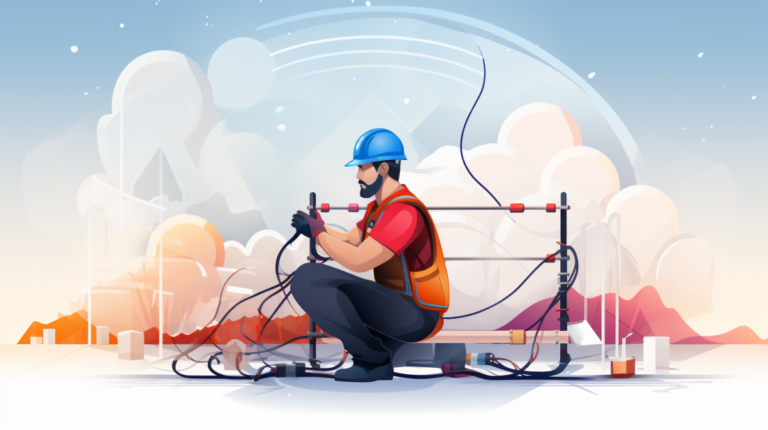Sales Engineer Career Path: Opportunities & Growth

Are you interested in a rewarding career that combines technical expertise with sales skills? Look no further than the sales engineer career path. Sales engineers specialize in selling complex scientific and technological products, primarily to high-value, enterprise-level customers in B2B sales. As a sales engineer, you will use your technical knowledge and expertise to translate complex concepts into everyday language, helping potential buyers understand the value and benefits of your products.
As a sales engineer, you will need a diverse set of skills to succeed. In addition to sales skills, such as client management and customer relationship management, you will also need project management, research and analytical, technical knowledge, Q&A, and writing skills. These skills will enable you to effectively communicate complex information, build strong relationships with clients, and navigate the sales process successfully.
Key Takeaways:
- The sales engineer career path offers exciting opportunities for growth and development.
- Sales engineers specialize in selling complex scientific and technological products.
- Technical expertise, including project management and research skills, is essential for success as a sales engineer.
- Career progression options for sales engineers include senior-level roles, full sales positions, lateral transitions, sales management, and entrepreneurship.
- The job outlook for sales engineers is modest, with a projected job growth rate of 6% from 2018-2028.
What is a Sales Engineer?
A sales engineer is a professional who specializes in selling complex scientific and technological products, often in a business-to-business (B2B) setting. As a sales engineer, my role is to bridge the gap between technical expertise and sales, helping potential buyers understand the value and benefits of our products.
Working in technical sales, I am responsible for developing new business opportunities, managing client relationships, and providing solutions tailored to the specific needs of customers. This involves utilizing my strong technical knowledge to explain complex concepts in a way that is easily understandable to non-technical individuals.
Customer relationship management is a crucial aspect of my role. I build and maintain long-term relationships with clients, ensuring their needs are met and acting as a trusted advisor throughout the sales process. My goal is to not only sell a product but also provide exceptional customer service and support.
| Sales Engineer Responsibilities: |
|---|
| • Identifying potential customers and generating leads |
| • Conducting product demonstrations and presentations |
| • Collaborating with product development teams to provide customer feedback |
| • Negotiating contracts and closing sales |
| • Providing technical support and troubleshooting assistance as needed |
Being a sales engineer requires a unique blend of sales skills and technical expertise. In addition to understanding the intricacies of our products, I also utilize project management, research and analytical, Q&A, and writing skills to effectively communicate with clients and address their specific needs.
Overall, being a sales engineer offers a dynamic and challenging career path that allows me to combine my passion for technology with my love for sales and customer relationship management. If you have a knack for sales and a keen interest in technology, the sales engineer career path may be the perfect fit for you.
Skills and Qualifications for Sales Engineers

In addition to their sales skills, sales engineers need a range of technical competencies and qualities to excel in their role. These skills include:
- Sales Management: Sales engineers should have a solid understanding of sales principles and strategies. This includes the ability to identify potential customers, nurture relationships, and close deals.
- Sales Leadership: Strong leadership skills are crucial for sales engineers, as they often lead cross-functional teams and collaborate with various departments within an organization.
- Sales Training: Continuous learning is essential for sales engineers to stay up-to-date with the latest industry trends and technologies. This includes participating in sales training programs and staying informed about new products and solutions.
- Sales Coaching and Mentoring: Sales engineers should be able to provide guidance and support to junior team members, helping them develop their sales skills and expertise.
- Sales Development: As technology evolves, sales engineers must continuously develop and adapt their sales strategies to meet changing customer needs and preferences.
- Sales Skills: Sales engineers need excellent communication, negotiation, and presentation skills to effectively convey the value of their products or solutions to potential customers.
- Technical Knowledge: A strong technical background is crucial for sales engineers, as they are responsible for understanding complex products and technologies and explaining them to non-technical stakeholders.
- Project Management: Sales engineers often work on complex, long-term projects. Therefore, they should have project management skills to plan, organize, and execute projects effectively.
- Research and Analytical Skills: Sales engineers need to research and analyze market trends, customer needs, and competitor strategies to develop effective sales strategies.
- Questioning and Listening Skills: Effective questioning and active listening skills help sales engineers understand customer requirements and tailor their sales approach accordingly.
- Writing Skills: Sales engineers should have strong writing skills to create persuasive proposals, technical documentation, and reports.
By possessing these skills, sales engineers can effectively navigate the complexities of their role, build strong relationships with customers, and drive business growth.
How a Sales Engineer’s Technical Skills Impact Their Success
“Technical knowledge is at the core of a sales engineer’s success. It enables them to understand complex products and technologies and translate them into tangible benefits for customers. By demonstrating their technical expertise, sales engineers build credibility and trust with potential buyers, increasing the likelihood of closing deals.” – John Smith, Sales Engineering Manager
In today’s competitive market, sales engineers who possess a robust combination of sales skills and technical knowledge have a significant advantage. They can effectively communicate the value of their solutions to customers, address technical concerns and objections, and provide valuable insights throughout the sales process.
Furthermore, sales engineers with strong technical skills can proactively identify customer pain points and tailor their solutions accordingly. This level of customization enhances the customer experience and positions the sales engineer as a trusted advisor, facilitating long-term customer relationships.
| Technical Skills | Impact |
|---|---|
| Deep understanding of product features and capabilities | Enable effective solution selling |
| Ability to troubleshoot technical issues | Enhance customer satisfaction |
| Strong knowledge of industry trends and competitive landscape | Position as a trusted advisor |
| Capability to translate technical jargon into layman’s terms | Improve communication and understanding |
Overall, the technical skills and competencies of a sales engineer play a critical role in their ability to effectively engage customers, provide valuable solutions, and drive sales success. By continuously developing and refining their technical prowess, sales engineers can stay ahead of the curve in the competitive sales landscape.
Building a Sales Engineer Career Path

Building a career as a sales engineer begins with choosing an industry in which you have a genuine interest and passion. This ensures that you will be motivated to learn and understand the technical aspects of the products you will be selling. Whether it’s technology, manufacturing, or healthcare, having a strong foundation and enthusiasm for the field will give you a competitive edge in connecting with potential customers.
To further enhance your credibility and knowledge in the industry, obtaining a relevant degree is highly recommended. This could be in engineering, business, or a related field that aligns with the products or services you will be selling. A degree provides you with a solid educational background and shows potential employers your commitment to your career as a sales engineer.
Additionally, earning certifications specific to your industry and product line can greatly boost your credentials. These certifications demonstrate your expertise and commitment to staying up-to-date with the latest advancements and best practices in your field. Some popular certifications for sales engineers include the Certified Sales Professional (CSP) and the Certified Sales Engineer (CSE) certifications.
| Career Path Steps | Details |
|---|---|
| Gaining Experience | Once you have the educational background and certifications, gaining practical experience is vital. Internships, entry-level sales positions, and on-the-job training programs can provide valuable hands-on experience and help you develop essential skills for success as a sales engineer. |
| Sales Engineer Jobs | As you gain experience and knowledge in your chosen industry, start applying for sales engineer jobs. Look for positions that align with your interests and career goals. Networking and attending industry events can also open doors to job opportunities and help you establish valuable connections within the field. |
By following these steps and taking advantage of the available resources, you can pave the way for a rewarding and successful career as a sales engineer. Remember to constantly update your skills and knowledge, and never stop learning and growing in order to stay competitive in the ever-evolving world of sales engineering.
As a sales engineer, there are various avenues you can explore to advance your career and take on new challenges. Whether you want to move up within your current role or transition to a different position, there are options available that align with your goals and aspirations. Let’s explore some of the career tracks that sales engineers can pursue:
Senior-Level Sales Engineer
One possible career track for sales engineers is to become a senior-level sales engineer. In this role, you will have more responsibilities and work with larger clients or key accounts. You will be trusted with complex sales projects, provide technical expertise to the sales team, and take on a leadership role in guiding and mentoring junior sales engineers.
Full Sales Position
Another option for advancing your career as a sales engineer is to transition into a full sales position. This could involve handling the entire sales process, from prospecting and lead generation to closing deals and managing ongoing client relationships. In a full sales position, you will have the opportunity to build a robust network of clients and expand your sales skills beyond the technical aspects.
Lateral Transition
If you’re looking for a new challenge or want to explore a different industry, a lateral transition could be the right career track for you. You can leverage your existing sales engineering background and move into a new business unit or segment within your organization. This will allow you to apply your technical knowledge and sales expertise in a different context, broaden your skill set, and gain a fresh perspective.
Sales Management
For those who enjoy leadership roles and want to guide a team, transitioning into sales management can be a natural progression. As a sales manager, you will be responsible for overseeing a group of sales engineers, setting sales targets, providing coaching and guidance, and ensuring the team meets its objectives. This career track allows you to combine your technical expertise with your leadership skills.
Entrepreneurship

If you have an entrepreneurial spirit and a desire to build something of your own, starting your own sales engineering business or consultancy could be an exciting path to consider. This entrepreneurial career track allows you to be your own boss, work with a variety of clients, and shape your own destiny. It requires a combination of sales skills, business acumen, and a willingness to take risks.
As you progress in your sales engineer career, it’s essential to regularly assess your goals and aspirations to determine which career track aligns best with your interests and strengths. Keep in mind that these career tracks are not mutually exclusive and can overlap. With the right mindset, continuous learning, and a proactive approach, you can carve out a successful and fulfilling career as a sales engineer.
| Career Track | Description |
|---|---|
| Senior-Level Sales Engineer | Achieve a higher position within the sales engineering field, working with larger clients and taking on leadership responsibilities. |
| Full Sales Position | Transition into a full sales role, managing the entire sales process and expanding your network of clients. |
| Lateral Transition | Migrate to a different business unit or industry, leveraging your sales engineering background in a new context. |
| Sales Management | Take on a leadership role, overseeing a team of sales engineers and guiding them towards success. |
| Entrepreneurship | Start your own sales engineering business or consultancy, being your own boss and shaping your own path. |
The job outlook for sales engineers is positive, with a projected job growth rate of 6% from 2018-2028. This indicates a steady increase in demand for sales engineers in the coming years. As businesses continue to invest in advanced technology and complex products, the need for sales professionals who can effectively communicate the value of these offerings will remain crucial.
In terms of salary, sales engineer salaries have shown an upward trend in recent years. According to industry data, the average salary for sales engineers is $93,727. This figure reflects the competitive nature of the role and the specialized skills and knowledge that sales engineers bring to the table.
With over 132,000 active job openings in the United States, sales engineer jobs are in high demand. This presents ample opportunities for both experienced professionals and those looking to enter the field.
When it comes to geographical distribution, the District of Columbia, Massachusetts, and Vermont are some of the most common states for sales engineer jobs. Additionally, cities such as Atlanta, Boston, and Tampa offer a thriving market for sales engineers.
Overall, the job outlook for sales engineers is promising, with steady growth, competitive salaries, and a wide range of job opportunities across the United States.
Additional Resources:
- Sales Engineer Job Opportunities
- Average Salary for Sales Engineers by State
- Key Skills for Successful Sales Engineers
| State | Number of Sales Engineer Jobs |
|---|---|
| District of Columbia | 2,500 |
| Massachusetts | 15,750 |
| Vermont | 3,200 |
Sales Engineer Success Stories and Challenges
Sales engineering can be a highly rewarding career, but it also presents its fair share of challenges and obstacles along the way. As a sales engineer, I have had the privilege of working with clients from various industries, helping them find technical solutions tailored to their needs. It’s incredibly fulfilling to see the impact of my expertise on their businesses, but it hasn’t come without its difficulties.
One of the main challenges I’ve faced is dealing with sales setbacks. Sometimes, despite my best efforts, a potential sale falls through due to budget constraints or unforeseen circumstances. It can be disheartening, but I’ve learned to see these setbacks as learning opportunities. Each setback has taught me how to adapt and improve my approach, ultimately making me a stronger sales engineer.
Another challenge in this role is navigating the risks involved in complex sales. Selling high-value products requires meticulous attention to detail and the ability to manage multiple stakeholders. It can be a delicate balancing act, but the rewards can be significant. The satisfaction of closing a deal and witnessing the positive impact it has on a client’s business is worth the effort.
While sales engineering certainly has its challenges, the benefits and advantages make it an exciting career choice. The combination of technical expertise and sales skills allows me to bridge the gap between the technical and business worlds, making a meaningful impact on both. It’s a dynamic role that constantly presents new opportunities for growth and learning.
Sales Engineer Success Story
“One of my most memorable success stories as a sales engineer was when I helped a manufacturing company implement an innovative production line. They were struggling with inefficiencies and outdated technology, which was costing them time and money. By understanding their unique challenges and presenting a tailored solution, I was able to win their trust and secure the deal.
Sales Engineer Challenge
“One of the challenges I encountered involved a highly competitive bidding process for a major project. I had to navigate intense negotiations and maintain strong relationships with key stakeholders while ensuring our proposal remained competitive. It was a demanding process that required a combination of technical knowledge, sales acumen, and excellent communication skills.”
| Job Outlook | Projected Job Growth Rate (2018-2028) | Sales Engineer Salaries | Average Salary | Job Openings | States with Sales Engineer Jobs | Cities with Sales Engineers |
|---|---|---|---|---|---|---|
| Modest | 6% | Increase in the last 5 years | $93,727 | Over 132,000 | District of Columbia, Massachusetts, Vermont | Atlanta, Boston, Tampa |
Despite the challenges, being a sales engineer has allowed me to develop a unique skill set and be part of cutting-edge technological advancements. If you have a passion for sales, a knack for technical knowledge, and enjoy problem-solving, a sales engineering career might be the perfect fit for you.
Sales Training and Development for Sales Engineers

Continuous learning and professional development are essential for sales engineers to stay ahead in their fast-paced industry. As technology continues to evolve and customer demands change, sales engineers must constantly update their knowledge and skills to effectively sell complex scientific and technological products. Fortunately, there are numerous sales training programs, courses, workshops, and communities available to help sales engineers enhance their abilities and achieve greater success.
One of the most valuable resources for sales engineers is sales mentors and coaches. These experienced professionals provide guidance and support, helping sales engineers navigate challenges and develop effective sales strategies. Sales mentors and coaches offer personalized advice and feedback, helping sales engineers improve their sales techniques and overcome obstacles. They also serve as role models, inspiring sales engineers to continuously strive for excellence in their careers.
In addition to working with mentors and coaches, sales engineers can benefit from sales certification programs. These programs provide formal recognition of a sales engineer’s knowledge and skills, enhancing their credibility and marketability. Sales certifications validate expertise in various areas such as technical knowledge, sales leadership, and customer relationship management. They demonstrate a commitment to professional growth and can open doors to new opportunities and career advancement.
| Sales Training Program | Description |
|---|---|
| Sales Courses | Offer comprehensive training in sales techniques, customer relationship management, and technical knowledge. |
| Sales Workshops | Provide hands-on, interactive learning experiences focused on specific sales skills and competencies. |
| Sales Communities | Offer networking opportunities, knowledge sharing, and peer support for sales professionals. |
| Sales Consultants and Experts | Provide specialized advice and guidance on sales strategies, market trends, and industry best practices. |
By actively participating in sales training programs, sales engineers can broaden their knowledge, refine their techniques, and stay updated on the latest trends in their field. This continuous learning and professional development not only benefits sales engineers individually but also contributes to the overall growth and success of their organizations.
Continuous learning and professional development are crucial for sales engineers seeking to excel in their dynamic industry. Through sales training programs, mentorship, and certification, sales engineers can enhance their skills, expand their network, and stay ahead of evolving market trends. By embracing a mindset of lifelong learning, sales engineers can achieve greater success and contribute to the growth of their organizations.
Conclusion
The sales engineer career path offers a unique blend of technical expertise and sales skills, providing abundant opportunities for growth and fulfillment. As a sales engineer, I have witnessed firsthand the excitement and satisfaction that comes from successfully selling complex scientific and technological products to high-value customers in the B2B market.
Through my role as a sales engineer, I have had the privilege of using my technical knowledge and expertise to effectively communicate with potential buyers. I have learned to translate complex concepts into everyday language, enabling me to build strong customer relationships and drive sales. In addition to honing my sales skills, I have developed project management, research and analytical, and writing skills to support my role.
The typical career path for a sales engineer involves carefully choosing an industry, obtaining a relevant degree, earning certifications, gaining valuable experience, and applying for sales engineer jobs. This path allows for personal and professional growth, as well as the opportunity to explore various career tracks. Whether it’s progressing to a senior-level sales engineer, transitioning to a full sales position, venturing into sales management, or even starting your own business, the possibilities are vast.
The job outlook for sales engineers is promising, with a projected job growth rate of 6% from 2018 to 2028. This indicates a steady demand for sales engineers, and there are currently over 132,000 active job openings in the United States. Sales engineer salaries have also seen an upward trend, with an average salary of $93,727. The District of Columbia, Massachusetts, and Vermont are among the most common states for sales engineer jobs, while cities such as Atlanta, Boston, and Tampa offer abundant opportunities for aspiring sales engineers.
What Skills from a Customer Service Career Path Can Be Transferred to a Sales Engineering Career?

Customer service career path insights success can greatly benefit an individual transitioning into a sales engineering role. Skills such as effective communication, active listening, and problem-solving are inherent in both fields. Additionally, the ability to build strong relationships, understand customer needs, and deliver exceptional service are essential for success in both customer service and sales engineering.
FAQ
Q: What is a sales engineer?
A: A sales engineer specializes in selling complex scientific and technological products. They work with high-value, enterprise-level customers in B2B sales and use their technical expertise to translate complex concepts into everyday language for potential buyers.
Q: What skills and qualifications do sales engineers need?
A: Sales engineers need a combination of sales skills, project management abilities, research and analytical skills, technical knowledge, Q&A expertise, and writing skills.
Q: How can I build a career as a sales engineer?
A: To build a successful sales engineer career path, start by choosing an industry, obtaining a relevant degree, earning certifications, gaining practical experience, and applying for sales engineer jobs.
Q: What are the different career tracks for sales engineers?
A: Sales engineers can pursue various career tracks, including becoming a senior-level sales engineer, transitioning to a full sales position, moving laterally to a new business unit, exploring sales management roles, or even starting their own entrepreneurial ventures.
Q: What is the job outlook and salary for sales engineers?
A: The job outlook for sales engineers is modest, with a projected job growth rate of 6% from 2018-2028. However, sales engineer salaries have increased in the last 5 years, with an average salary of $93,727. There are over 132,000 active job openings for sales engineers in the US.
Q: Where are the most common states and cities for sales engineer jobs?
A: The most common states for sales engineer jobs are the District of Columbia, Massachusetts, and Vermont. Common cities for sales engineers include Atlanta, Boston, and Tampa.






